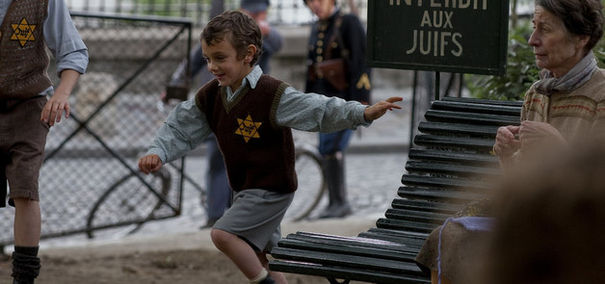Manipulating Emotions
The true story of a Nazi deportation in 1942 Paris strives for historical accuracy but fails to find a balance. Directed by Roselyne Bosch.

LA RAFLE
With the massive marketing campaing surrounding the release of LA RAFLE, we may ask ourselves what the film could possibly hide. Roselyne Bosch's new work tackles the delicate subject of the Shoah and aims, as many historical films do, to educate the new generations about the lesson of the past, while reminding the older ones of the mistakes that were made.
It is only natural that we investigate the ways in which these films set out to achieve such an admirable goal. After all, LA RAFLE already has its own spot within the French educational system – as SCHINDLER’S LIST had in the United States.
It is clear from the start that realism was a huge concern for the director. Archive footage of Nazi-occupied Paris is chosen to introduce the viewer to the fiction, and the involvement of several historians and survivors in the film to ensure accuracy is always evident.
As commendable as it may be, the effort is not enough to carry the film, which would also need substantial dramatic material. Besides, only Joseph Weiszman, now aged 80, survived the camp of Beaune-La-Rolande, making the notion of close depiction of reality somewhat problematic.
There is a distinct fracture between the first part of the film, strictly factual, and the last. Following the deportation to Vel d'Hiv, LA RAFLE abandons the path of historical exactness and loses itself in melodramatic overflows. From this point on, the material feels overtly dramatized and manipulated, particularly in the way it handles the contrast between the innocent children’s world and the hardships of reality. Noé Zygler's character, whose angel visage and naivety are exemplar, is notably used – the term here seems to be justified – to secure the viewer's empathy, thanks to his lisp and his incomprehension of the events.
With its heavy realiance on violins and classical repertoire (Wagner, Debussy), even the soundtrack is forcibly tear-jerking, often struggling to underline the points the story is trying to make, as in the justaposixion of Hitler's idleness and the Jews' malnutrition.
LA RAFLE’s attempt to enhance the horror of the story tragically backfires. Instead of following is primary objective – to reproduce the facts in the most realistic way – the film paradoxically attenuates their atrocity (meant as it is to be shown to children) and exaggerates the relational melodrama.
Was such heavy dramatisation really necessary? Would history not suffice? As heartfelt and respectable as it is, the authors’ intent to shed some lights on a crucial page of France’s past should perhaps have been conveyed through a more factual account. Instead, it quickly sinks into pathetic sentimentalism.


301 Moved Permanently